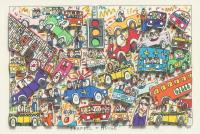
James Rizzi
James Rizzi's prints are a living and breathing part of the city where he was born and raised. In these prints, the excitement, noise, congestion, and pace of city life translate into pictures of extraordinary vitality and exuberance. Viewed from a distance Rizzi's prints appear bright and joyful; close up they reveal a myriad of precisely defined details - children playing, cars, vendors, rooftops, boats, sails - woven into a throbbing narrative of daily life that we can all enjoy, regardless of whether we live in the city or country. Rizzi has described the style of these childlike, three-dimensional prints as "urban-primitive" - a phrase that cleverly juxtaposes the incongruities of his sophisticated printmaking technique with the naive, robust spontaneity of his images. Indeed, the impact of Rizzi's prints is underscored by their effective three-dimensionality. Each print is a multilevel sculpture with the color image standing out in relief from the flat background.
Rizzi calls his unique printmaking technique the "two for one process" because two color prints are required to make one final print. This is the process: first, Rizzi makes his print (he prefers silk-screen and lithography) in the traditional manner, combining as many as fifteen colors to achieve emphasis - a complex job in itself; then he cuts out the tiny components of his compositions - cars, people, buildings, etc. Each individual piece (and there may be dozens in a single print) is then adhered above a second impression of the identical print using double faced mounting tape. These cutouts may be raised 1/8", 1/4", or 3/8" above the flat print, adding a richly sculptural sense of movement and playfulness to the already vibrating image. It is hard to imagine the hours of meticulous care required to hand-cut and then adhere a single print, let alone an edition of 99 impressions. Some of the excitement of Rizzi's prints is lost in color photographs that can only hint at their depth and impact. His prints must really be seen firsthand to be enjoyed most fully.
Born in New York City, Rizzi began making three-dimensional prints during his senior year as an art student at the University of Florida and has been winning awards for his prints ever since. Like Miro, Debuffet, Klee, and Picasso - the artists whom Rizzi admires most and with whom he feels a kinship of spirit - Rizzi enjoys experimenting in a variety of media. His love of freedom expresses itself in the topsy-turvy jumble of his crowded street scenes, in his fresh approach to color, and in his choice of artistic projects.